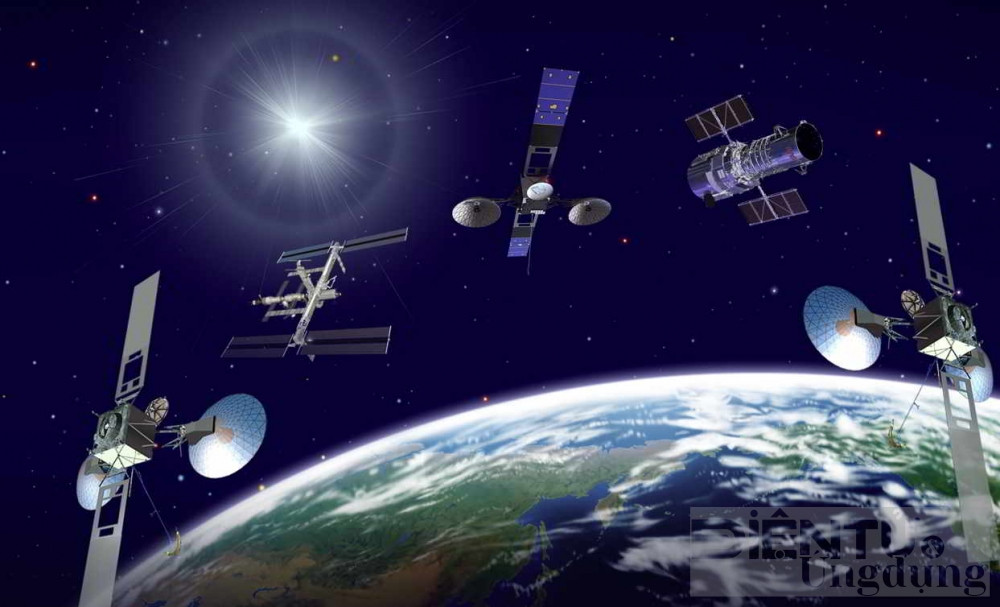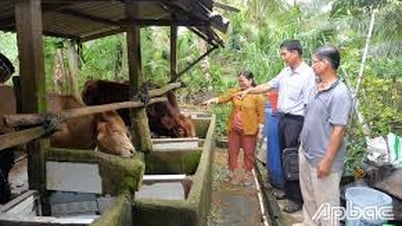
While low-orbit satellites have many benefits, there are also issues related to space junk and the management of small satellites. Photo: TL
On February 19, the National Assembly voted to pass a Resolution on piloting a number of special policies and mechanisms to create breakthroughs in the development of science, technology, innovation and digital transformation.
One of the important contents of this resolution is to allow controlled pilot implementation of telecommunications services using low-orbit satellite technology.
Accordingly, the pilot project will control investment in telecommunications services with network infrastructure, satellite telecommunications network type using low-orbit satellite technology in Vietnam on the principle of ensuring national defense and security, in which there is no limit on the percentage of shares owned, capital contribution or contribution ratio of foreign investors.
Piloting the granting of licenses to use radio frequencies and equipment for telecommunications service providers using low-orbit satellite technology replaces the granting of licenses to use radio frequencies and equipment for terminal users.
This pilot project is decided by the Prime Minister, but not more than 5 years and must end before January 1, 2031.
According to this decree, the piloting of low-altitude satellites must be based on the requirements of socio-economic development, ensuring national defense and security; the Prime Minister decides on the piloting of each project, including: types of telecommunications services, limits on the scope of deployment, limits on the maximum number of subscribers, frequency of use, conditions for ending the pilot, requirements for ensuring national defense and security, and other necessary requirements and conditions to ensure national interests.
The Ministry of Science and Technology will grant, amend, supplement, and revoke telecommunications service business licenses for enterprises and guide and implement the granting, amendment, supplementation, and revocation of radio frequency and equipment use licenses for enterprises providing telecommunications services using low-orbit satellite technology.
The National Assembly also assigned the Ministry of National Defense and the Ministry of Public Security to organize and implement measures to inspect and control the pilot implementation of activities to ensure national defense and security.
According to experts' analysis, the deployment of low-altitude satellites can bring many benefits to Vietnam such as providing telecommunications and Internet services in remote areas where telecommunications infrastructure is underdeveloped.
The deployment of satellite broadband Internet will help businesses, governments, schools and individuals living anywhere in the world have access to high-speed Internet service.
The advent of satellite telephony is considered the most important revolution in mobile communications in decades. Carriers want to use satellite technology to clear signal gaps – areas where building cell towers or fiber optic networks is not feasible.
An estimated 350 million people globally lack access to mobile broadband and this technology is expected to open up opportunities for them.
In addition, low-altitude satellites help improve Earth monitoring capabilities, from climate change monitoring to natural disaster monitoring and environmental monitoring.
In the field of defense and security, low-altitude satellites help Vietnam improve its ability to monitor security, protect territory, and participate in defense activities.
Having its own satellite can also create a solid foundation for domestic technology development, enhancing self-reliance.
Experts say that deploying low-altitude satellites is a potential direction for Vietnam, but requires careful preparation in terms of technology, resources, and long-term planning.
In 2013, Vietnam launched VNREDSat-1, an Earth observation satellite designed to monitor the environment and natural resources. This satellite operates in low orbit with high image resolution, mainly serving the tasks of monitoring agriculture, forests, climate change and natural disasters.
By 2018, Vietnam had launched Microsat-1, a scientific research and Earth observation satellite for the purpose of monitoring the environment, resources and natural disasters. Both of Vietnam's low-orbit satellites were launched with the support of India through the Indian National Space Center (ISRO).
Vietnam and India have established a long-standing cooperative relationship in the space sector, enabling Vietnam to develop and launch its own satellites.
Experts say that countries like the US and private companies like SpaceX are deploying thousands of low-Earth satellites (such as SpaceX's Starlink project with a target of up to 12,000 satellites) to provide global services. However, Vietnam can start with a smaller number of satellites and gradually expand over time because the cost of launching satellites is not small. For example, launching a CubeSat (small size) satellite will cost about 100,000 USD to 500,000 USD (only counting the construction and launch costs). The cost of launching a SmallSat satellite will cost about 1 million USD to 10 million USD. For larger and more complex satellites, it can be up to 10 million USD to 100 million USD.
Thus, if Vietnam wants to deploy a number of low-altitude satellites for environmental monitoring, communication, or scientific research purposes, the initial cost could be several million USD per satellite, not to mention the launch and long-term operating costs.
While low-orbit satellites have many benefits, there are also issues related to space debris and the management of small satellites. There needs to be a good process for controlling and handling this issue to avoid the situation where old satellites and space debris pose a danger to other satellites.
Vietnamnet.vn


![[Photo] Magical moment of double five-colored clouds on Ba Den mountain on the day of the Buddha's relic procession](https://vphoto.vietnam.vn/thumb/1200x675/vietnam/resource/IMAGE/2025/5/9/7a710556965c413397f9e38ac9708d2f)


![[Photo] General Secretary To Lam and international leaders attend the parade celebrating the 80th anniversary of the victory over fascism in Russia](https://vphoto.vietnam.vn/thumb/1200x675/vietnam/resource/IMAGE/2025/5/9/4ec77ed7629a45c79d6e8aa952f20dd3)
![[Photo] Russian military power on display at parade celebrating 80 years of victory over fascism](https://vphoto.vietnam.vn/thumb/1200x675/vietnam/resource/IMAGE/2025/5/9/ce054c3a71b74b1da3be310973aebcfd)
![[Photo] Prime Minister Pham Minh Chinh chairs a special Government meeting on the arrangement of administrative units at all levels.](https://vphoto.vietnam.vn/thumb/1200x675/vietnam/resource/IMAGE/2025/5/9/6a22e6a997424870abfb39817bb9bb6c)

















































































Comment (0)